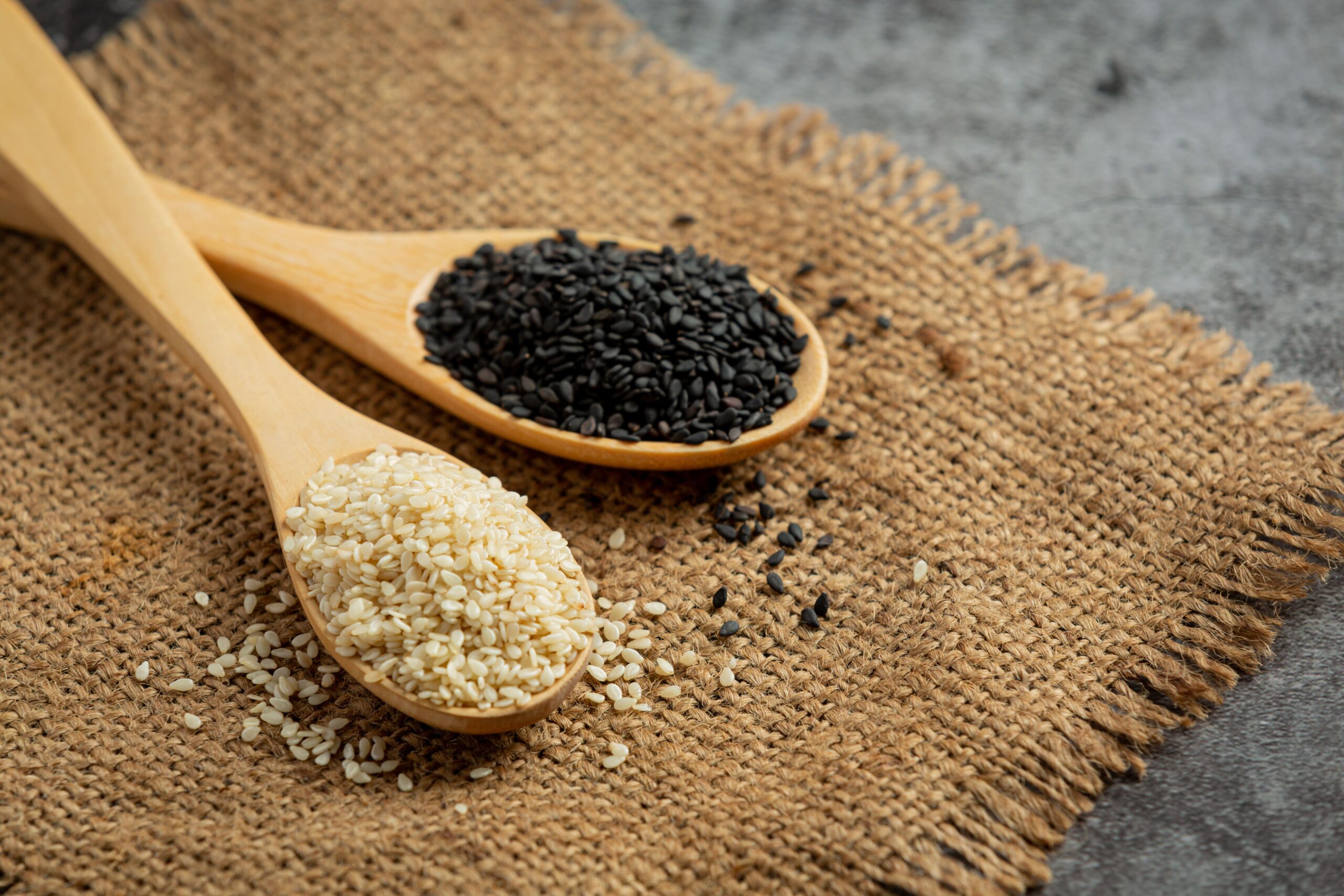The 7 Beneficial Effects of Sesame

Sesame seeds are tiny seeds obtained from the sesame plant also known as Sesamum indicum. They are annual herbs with flowers that look like foxgloves. These flowers produce pods that hold the sesame seeds until they are matured. The pods pop once the seeds are matured exposing them to the outer world.
Sesame seeds are available in two forms – hulled and unhulled. The hull is the edible coating on the seed that gives it a golden-brown shade. Hulled seeds are those whose hulls have been removed during industrial processing. They are of off-white color, which changes to brown when roasted.
Sesame is the oldest condiment in human history. Its use dates back to the Harappan civilization in the Indian subcontinent around 5000 years ago where it was utilized for agricultural purposes. Sesame plants are largely grown in the tropical and subtropical regions including India, China, Africa, and South America.
The culinary uses of sesame have been known to mankind since the very beginning. It is used in various sweets and savory, all over the world, though most commonly in Asia and the Middle East. Sesame oil is usually used for sauces and dressings.
Sesame is also used as feed for livestock and poultry. Its oil is also an important part of various industrial products like soap, margarine, oleaginous vehicle for medicines, an industrial solvent, etc.
Essential Health Benefits of Sesame
Sesame seeds are rich in antioxidants, vitamins, and proteins★ that are attributed to the variety of health benefits sesame offer. These benefits include protection against diabetes, cancer, heart diseases, high cholesterol, and Arthritis★. Most blood pressure patients prefer using sesame oil for cooking.
Sesamum indicum is also an excellent source of sesamin★ – a fat-soluble lignan known for its anti-inflammatory and antioxidant properties★. Moreover, sesame are exceptionally helpful in body weight management★.
Expanding on this review, below are some amazing health benefits of sesame.
1. Reduces Cholesterol Level
The lignans and Phytosterols -a plant compound that acts as human cholesterol, found in sesame are known to reduce body cholesterol and fat. Here are some results derived from several studies conducted to prove the effect of sesame on cholesterol.
Moreover, the composition of sesame seed is 44% Polyunsaturated fats, 40% monosaturated fats and 15% Saturated fats. Researches have shown that consumption of poly- and Monounsaturated fatty acids contributes to lowering cholesterol★ which further mitigates the chances of cardiovascular diseases.
2. Lowers Blood Pressure
Hypertension is a common cause of strokes and cardiovascular diseases. This risk factor can be regulated using sesame seeds that are rich in magnesium★. Furthermore, antioxidants, vitamins, and lignans in sesame seed impede plaque buildup arteries which maintain favorable blood pressure★.
Various human and animal studies have been conducted to test the effect of sesame seeds on blood pressure. In one study★, participants were given 2.5 grams of black sesame seed (a rare variety) in the powdered form daily for a month. The results showed a 6% decrease in systolic blood pressure of test group as compared to the control group.
Here is another study involving rats. During the research, various amounts of sesamol – the primary antioxidant found in sesame oil, were given to hypertensive rats for 6 weeks. The results showed a considerable decrease in blood pressure★.
3. Contributes to Bone Strengthening
Sesame seeds, hulled, or unhulled are rich sources of nutrients that support the strengthening of bones. These nutrients include calcium, magnesium, zinc, manganese★. A slight issue here is that sesame seeds also contain antinutrients -oxalates and phytates that obstruct the absorption of the healthy nutrients in the bones. However, there are ways to regulate the impact of these compounds. For instance, you can try sprouting, roasting, and soaking the seeds. A study focused on limiting the effects of antinutrients★ in sesame indicated that sprouting sesame seeds reduced the effect of oxalates and phytates by 50%.
4. Reduces Inflammation
Sesame seeds have a high potential for fighting inflammation★. Inflammation is a type of response or immune reaction to a stimulus -pathogen, injury, etc. but it can lead to some serious chronic diseases like diabetes, cancer, obesity, heart disease, and kidney disease. Thus, it is important to treat inflammation right away.
Previous research on plant oils have indicated that sesame oil has been used in traditional Taiwanese medicine to relieve the inflammatory pain of joints and wounds★. Moreover, massage with topical sesame oil has shown to be effective in significantly reducing pain severity of patients with limb trauma★. This anti-inflammatory property of sesame oil has been attributed to sesamin and sesamolin★, the two main lignans detected in sesame seeds oil.
5. Prevents Cancer
Cancer is a severe inflammatory condition that has been killing millions of people around the world. Studies predict the increase in cancer patients to up to 24 million by 2035★ and the number of deaths to reach up to 14.6 million per year★
Although there are various treatments for this condition like chemotherapy, radiotherapy, etc., we still need reliable solutions because contemporary treatments have potentially unbearable side effects. Thus, researchers are heavily engrossed in finding better and healthier treatments for these issues, if not treatment, at least prevention.
With this aim, researchers have tested various organic compounds against cancer -sesame being one of them. There have been a number of in-vitro and in-vivo studies to confirm the anti-cancerous properties of sesame and true to their expectations, researchers have mostly received positive outcomes.
Sesamin is a lignan extracted from sesame oil. It is widely consumed as a dietary supplement to reduce fat. According to a recent animal study conducted on mice, sesamin was found inhibiting the spread of tumor★ and formation of colonies. It also withered the tumor cells drug resistance and mitigated tumor growth.
Sesamin also exhibits significant anti-proliferative effects. It has been observed to cease the rapid and abnormal growth of various tumor cells including cancers of prostate, lung, pancreas, breast, colon, and leukemia★. Since this property acts differently on different cancer cells, we still need detailed research to unveil those mechanisms for better utilization.

6. Helps With Bodyweight Management
According to the world health organization, the number of obese patients has been tripled between 1975 and 2021★. Obesity is the major root cause of a number of other diseases including diabetes, heart diseases, cancer, high blood pressure, etc.
Consequently, obesity has gained a lot of attention in recent years. Researchers are finding natural ways to prevent and treat this condition. Sesame for its nutrient-rich composition has gained considerable attention in this regard. Its lignan content is mainly attributed to its physiological properties like antioxidation, anti-inflammation, and anti-obesity★.
According to a systematic review of clinical trials aimed at investigating the effects of sesame on body weight and composition, consumption of sesame oil can help with weight loss★ and reduction in BMI or Body Mass Index -the measure of a person’s weight with respect to his height. These properties are associated with its fat-burning capability.
For an adult a BMI of 18.5 to 24.9 is normal. A slightly higher BMI between 25 and 29.9 indicates fatness where as BMI equal to and greater than 30 means the adult is obese.
7. Regulates Blood Sugar Level
Sesame seeds are rich in proteins and essential fats whole low in carbohydrates★. This composition is potentially effective in regulating blood sugar levels★. Apart from that, the main component that particularly supports this property is pinoresinol – a type of lignan★. This compound mitigates the activity of maltase, a digestive enzyme responsible for the breakdown of carbohydrates mainly maltose. It is present in the mouth and small intestine. Reduced maltose digestion lowers the blood glucose level.






